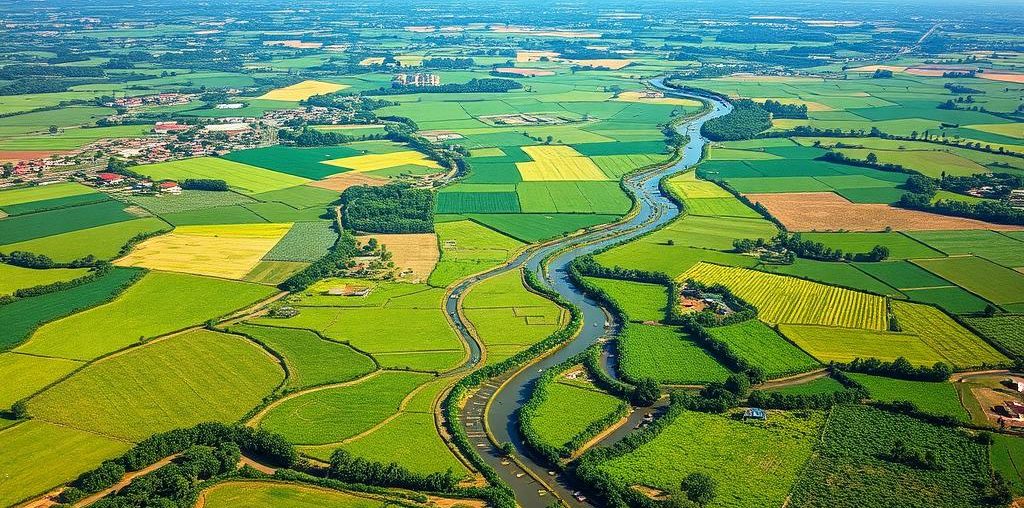Agriculture is key to Nigeria’s economy, playing a big role in its growth and success. The country’s vast croplands and busy markets show how important farming is. It gives people food, jobs, and helps the economy grow.
This article will look at how agriculture affects Nigeria. Next, we’ll discuss its role in the economy, followed by an exploration of the challenges it faces. Finally, we’ll examine new solutions aimed at improving farming for both farmers and consumers.
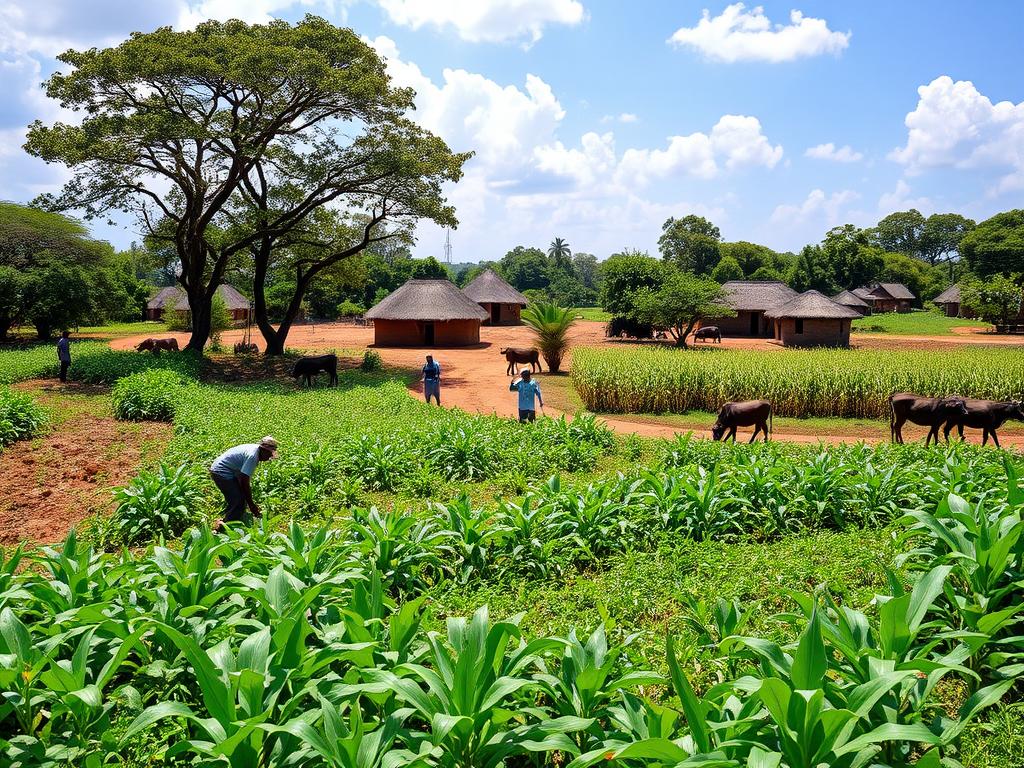
We’ll begin by seeing how important factors like growing crops, farming methods, soil care, water systems, and pest control are. Additionally, we’ll explore how technology, green farming, and support for small farmers are gradually changing the landscape of agriculture.
By the end, you’ll know a lot about agriculture in Nigeria. Moreover, you’ll see its potential along with the plans to ensure food security, economic stability, and environmental sustainability.
Overview of Agriculture in Nigeria
Agriculture is crucially key to Nigeria’s economy, as it makes up a significant part of the country’s GDP and employs many people. Moreover, Nigeria’s varied geography and climate are ideal for numerous farming activities, including both crop production and livestock rearing.
Importance of Agriculture to the Nigerian Economy
Agriculture is crucial in Nigeria, contributing approximately 24% of the GDP. Moreover, it is a major job creator, supporting over 70% of the population, especially in rural areas. Additionally, this sector helps ensure food security while also generating foreign revenue through the export of crops like cocoa, coffee, and palm oil.
Major Agricultural Products and Regions
Nigeria is known for its wide range of agricultural products, including:
- Staple crops: Yams, cassava, maize, rice, and sorghum, mainly grown in the north and center.
- Cash crops: Cocoa, coffee, and palm oil, mainly from the south and west.
- Livestock: Cattle, sheep, and goats, mostly in the north and center.
Nigeria’s varied climate and soil allow it to produce a wide range of crops. As a result, this makes the country a significant player in the global agricultural market.
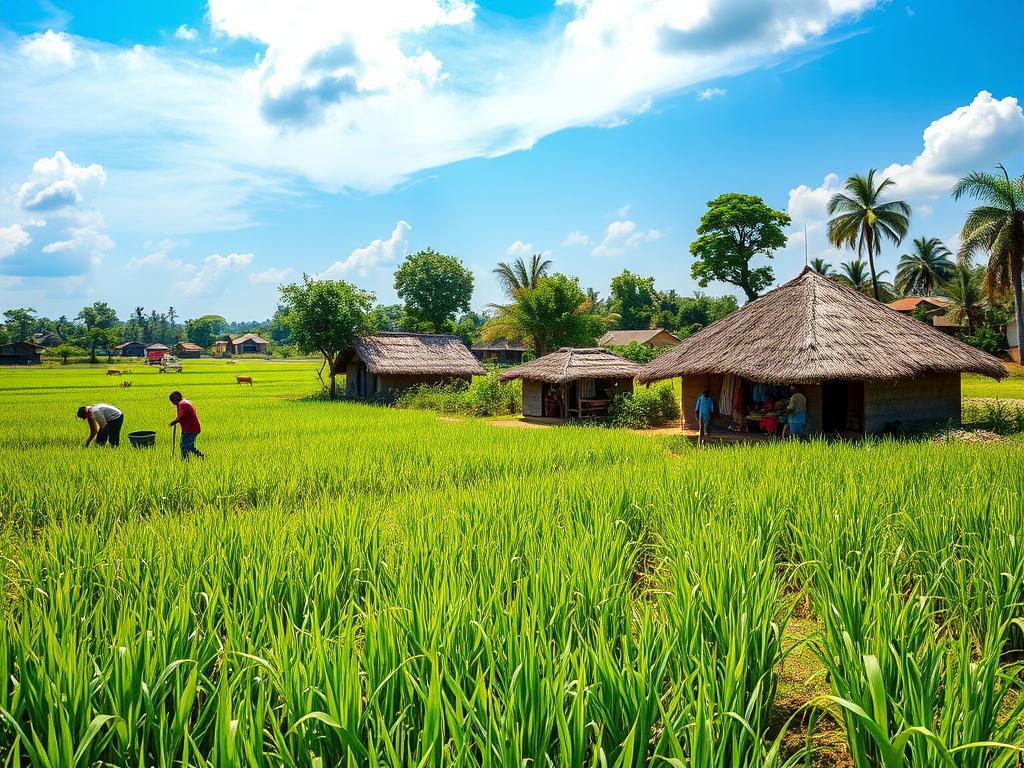
Agriculture and Economic Growth
Agriculture is undoubtedly key to Nigeria’s economic growth. Not only does it constitute a large portion of the country’s GDP, but it also provides jobs for many people. Furthermore, agriculture plays a major role in both Nigeria’s overall economic growth and the growth of its agribusiness sector.
Nigeria’s farms make up a significant part of the country’s GDP, which clearly demonstrates how important farming is to the economy. Furthermore, the sector is already strong and, it has the potential to grow even further. This is mainly due to the diverse range of agricultural products grown in different parts of Nigeria, including staple crops, cash crops, and livestock.
The agricultural sector also provides jobs to many people, especially in rural areas. In particular, it’s important for small farmers to have employment opportunities. As a result, this helps reduce unemployment while also contributing to the country’s overall growth.
Also, agriculture is a big part of Nigeria’s exports. It brings in foreign money for the country. This shows how important farming is for economic growth and a strong trade balance.
Nigeria is focusing on growing its agricultural sector. This could lead to more economic growth and agribusiness growth. By using its agricultural resources and making smart policies, Nigeria can make the most of its farms. This will help with its economic growth and development.
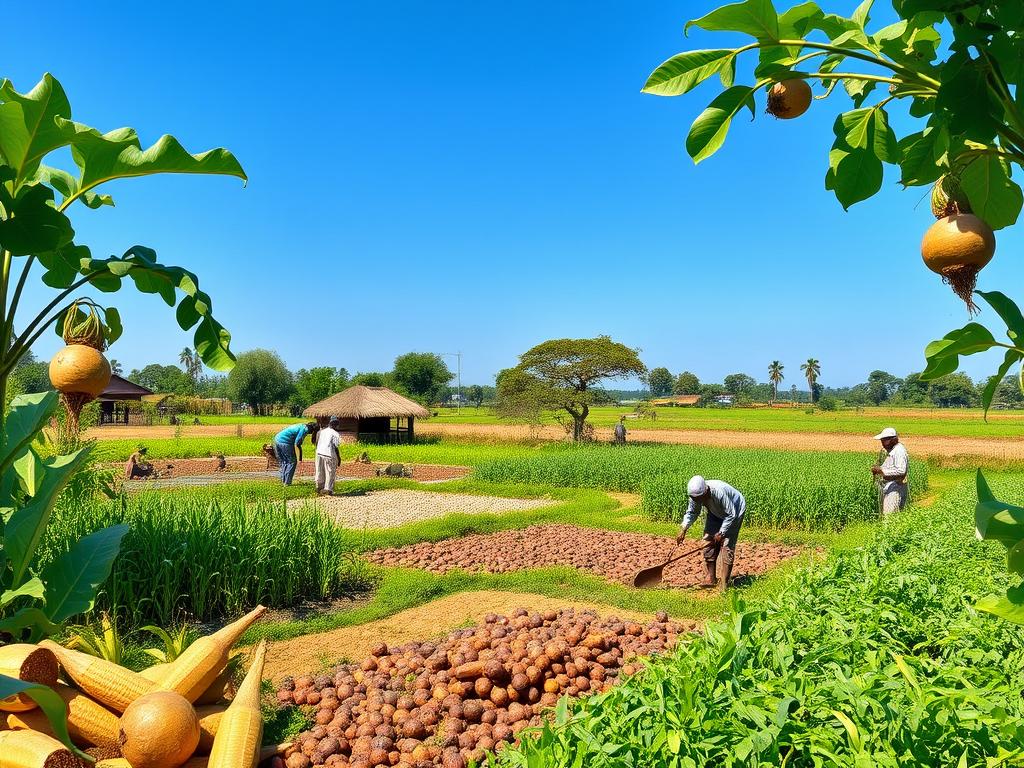
Sustainable Farming Practices
In Nigeria, sustainable farming is key for keeping farms productive as well as maintaining a healthy environment. For instance, crop rotation and soil management are two important methods that work well.
Crop Rotation and Soil Management
Crop rotation involves growing different crops one after the other on the same land. Consequently, it’s a great way to keep the soil healthy. By varying crops, farmers can add nutrients to the soil and combat pests and diseases. As a result, this reduces the need for harmful fertilizers.
Good soil management is also vital for sustainable farming. Practices like cover cropping help protect the soil and add organic matter. No-till farming keeps the soil’s structure and moisture, making it better for farming in the long run.
Integrated Pest Management
Integrated Pest Management (IPM) is a method to control pests and diseases without solely relying on chemicals. Instead, it utilizes biology, culture, and mechanical approaches to keep pests in check. As a result, this method is better for the environment and prevents pests from becoming resistant to pesticides.
By using these sustainable farming methods, farmers in Nigeria can make their soil healthier, thereby lessening their environmental impact, and improving the productivity and resilience of their farms.
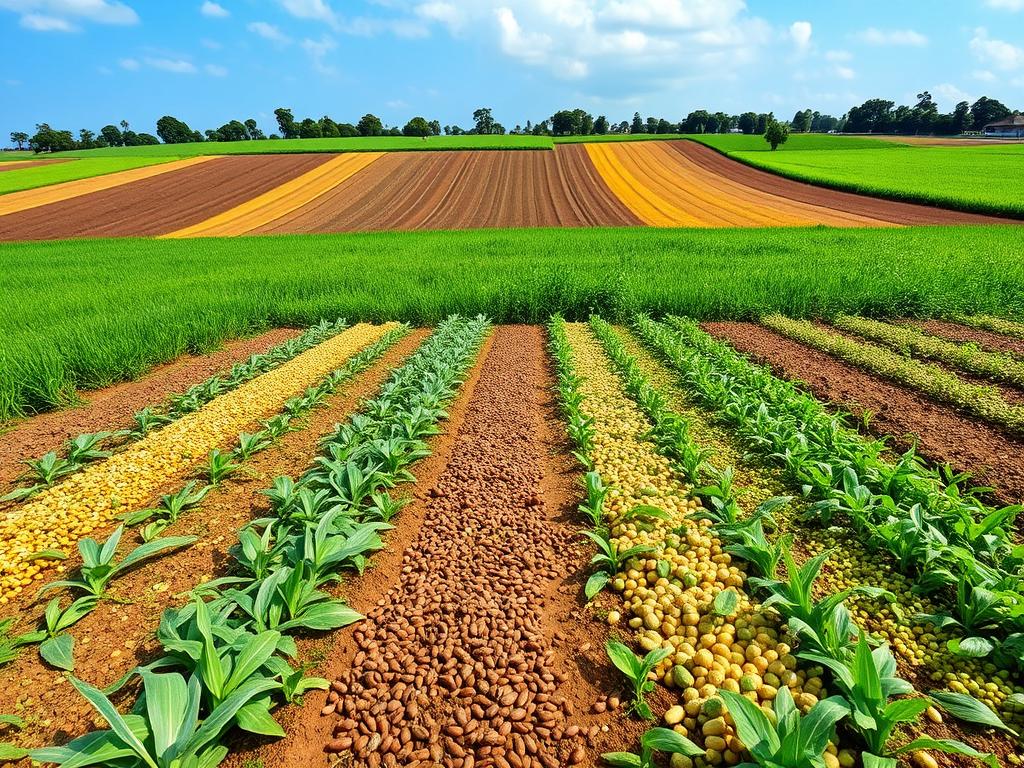
Irrigation and Water Management
In Nigeria’s dry areas, getting enough water for farming is key. Irrigation systems help by providing a steady water supply, especially in the dry seasons. This makes farming more productive.
Managing water is tough in Nigerian farming. The weather is unpredictable, leading to droughts. New irrigation methods like drip irrigation and sprinkler irrigation help save water and spread it evenly across the land.
Using precision farming and IoT (Internet of Things) changes how we manage water in farming. These tools help farmers check soil moisture, set the right watering times, and use water wisely. This makes farming more efficient and sustainable.
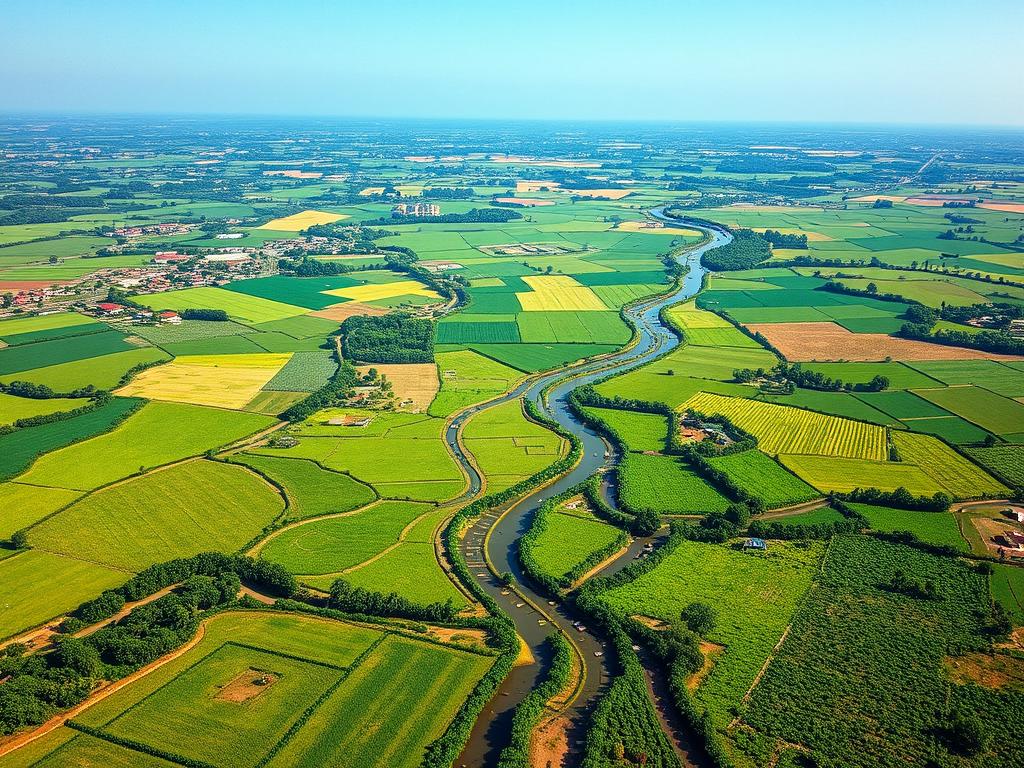
Water harvesting and storage systems are also key. They collect rainwater in the wet seasons for use in the dry seasons. This cuts down on the need for scarce water from wells or rivers.
The Nigerian government and farming experts are tackling water management issues. They’re focusing on better irrigation and water tech to make farming sustainable and grow the sector.
Role of Technology in Agriculture
Technology is changing the way Nigeria farms. It brings new ways to farm with precision and uses the Internet of Things (IoT). This makes farming more efficient, productive, and helps farmers make better decisions.
Precision Farming and IoT Applications
Precision farming uses advanced tech to improve how we manage crops and animals. It uses GPS, sensors, and aerial images to give farmers detailed info about their land and animals. This helps farmers decide on things like watering, fertilizing, and controlling pests.
IoT is also changing farming. IoT devices like smart sensors and connected farm tools send important data on soil moisture, weather, and crop health. This lets farmers make smart, data-based choices. It boosts productivity and cuts down on waste.
Using tech like precision farming and IoT is making Nigerian farms more efficient. It’s also making farming more sustainable and good for the environment. As Nigeria keeps using these new solutions, the future of farming looks very promising.
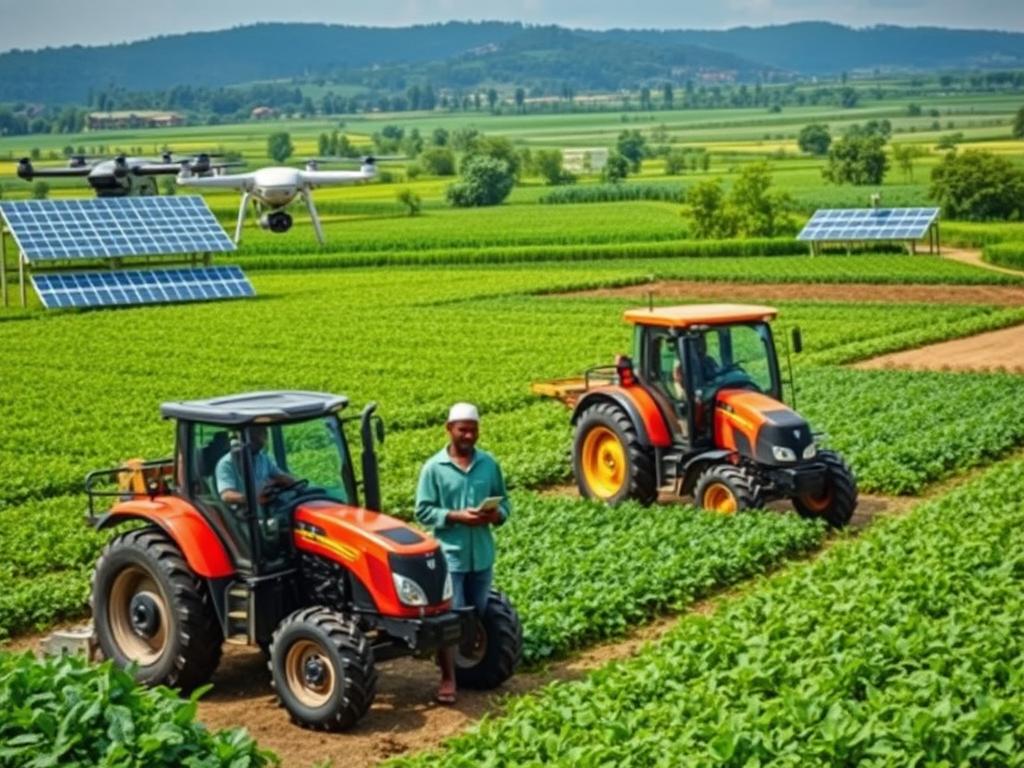
Challenges Facing Nigerian Agriculture
The Nigerian agriculture sector faces many challenges that slow its growth. Managing the country’s soil is a big issue. Soil degradation, erosion, and nutrient loss make sustainable farming hard in Nigeria.
There’s also a big problem with irrigation. Many farmers depend on rain, making them prone to climate change and weather unpredictability. They need better irrigation and water management.
- Pest control is a big challenge, with pests and diseases hurting crop yields. Poor pest management and limited modern pest control tech lead to big crop losses.
- Getting to agricultural resources like quality seeds, fertilizers, and farm tools is hard for many farmers, especially small ones.
Climate change, with more droughts, floods, and extreme temperatures, threatens Nigerian agriculture. It’s vital to develop resilient farming and adapt to these changes for the sector’s future.

To tackle these issues, the Nigerian government and stakeholders must focus on new solutions. This includes precision farming, integrated pest management, and better irrigation systems. Research, tech, and educating farmers are key to overcoming Nigerian agriculture challenges.
Agriculture and Food Security
Agriculture is key to food security in Nigeria. It helps fight malnutrition and hunger, keeping the country’s people healthy. With a focus on farming, Nigeria is working to boost food production and get food to everyone.
Addressing Malnutrition and Hunger
Malnutrition and hunger are big problems in Nigeria, affecting many people. Agriculture is a key way to fight these issues by making more nutritious food available. The government and others are putting money and effort into making sure everyone gets enough good food.
- Promoting sustainable farming practices to enhance crop yields and nutritional value
- Investing in infrastructure to improve food distribution and reduce post-harvest losses
- Educating communities on the importance of balanced diets and proper nutrition
- Collaborating with international organizations to address food security and malnutrition challenges
By tackling hunger and malnutrition with smart farming plans, Nigeria can make its people healthier. This will help create a brighter, more secure future for everyone.
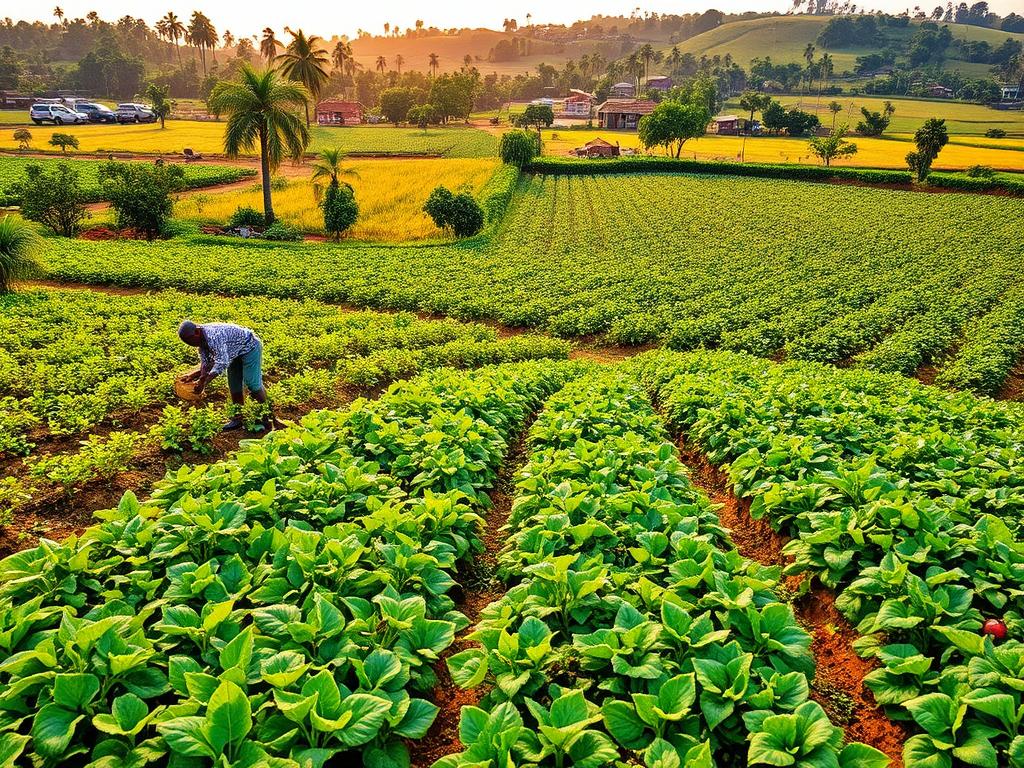
Empowering Smallholder Farmers
In Nigeria, smallholder farmers are key to the country’s food production. They work hard with little resources. But, they face many challenges that stop them from reaching their full potential.
One way to help them is by using agricultural technology. This gives them modern tools and new ways to farm. It helps them grow more food and take care of the land for the future.
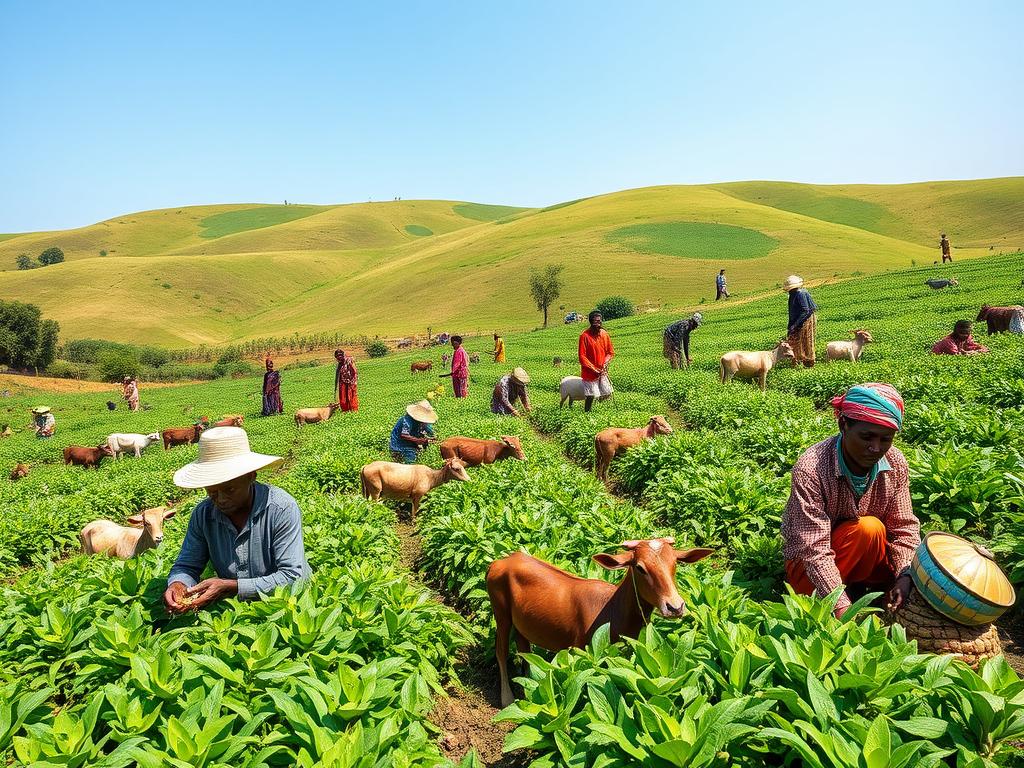
Education and training are also vital. They teach farmers about sustainable farming techniques and how to get to market and manage money. With the right knowledge, farmers can make better choices and adapt to changes in farming.
The success of Nigeria’s farming depends on the success of its smallholder farmers. Supporting them with the right tools and knowledge can make a big difference. It can help the country use its farming resources well and ensure a secure food future.
Agriculture and Environmental Sustainability
Nigeria’s agriculture is key to its economy. It’s important to look at how farming affects the environment. Using sustainable farming methods is key to lessen the harm to the environment and keep farming going long-term.
Crop rotation is a big part of sustainable farming. By changing what crops grow in the same spot, farmers make the soil better, use fewer chemicals, and fight pests. This is good for the planet and makes farming more reliable and productive.
Integrated pest management (IPM) is another way to farm better. It uses natural ways to fight pests, like bugs that help farmers and safe pesticides. This cuts down on harmful chemicals and keeps pests under control.
Good water management is vital for farming the right way. Using smart irrigation and saving water helps protect our water and keeps it clean and available.
Using precision farming and Internet of Things (IoT) tech helps too. These tools help farmers use less and waste less, and keep an eye on the environment. This makes farming better for the planet and more efficient.
By choosing these sustainable ways, Nigerian farmers can lessen the harm farming does to the environment. This helps fight climate change and keeps farming strong for the future.
- Crop rotation to improve soil fertility and reduce pest infestations
- Integrated pest management to minimize the use of chemical pesticides
- Efficient water management to conserve water resources
- Precision farming and IoT applications to optimize inputs and reduce waste
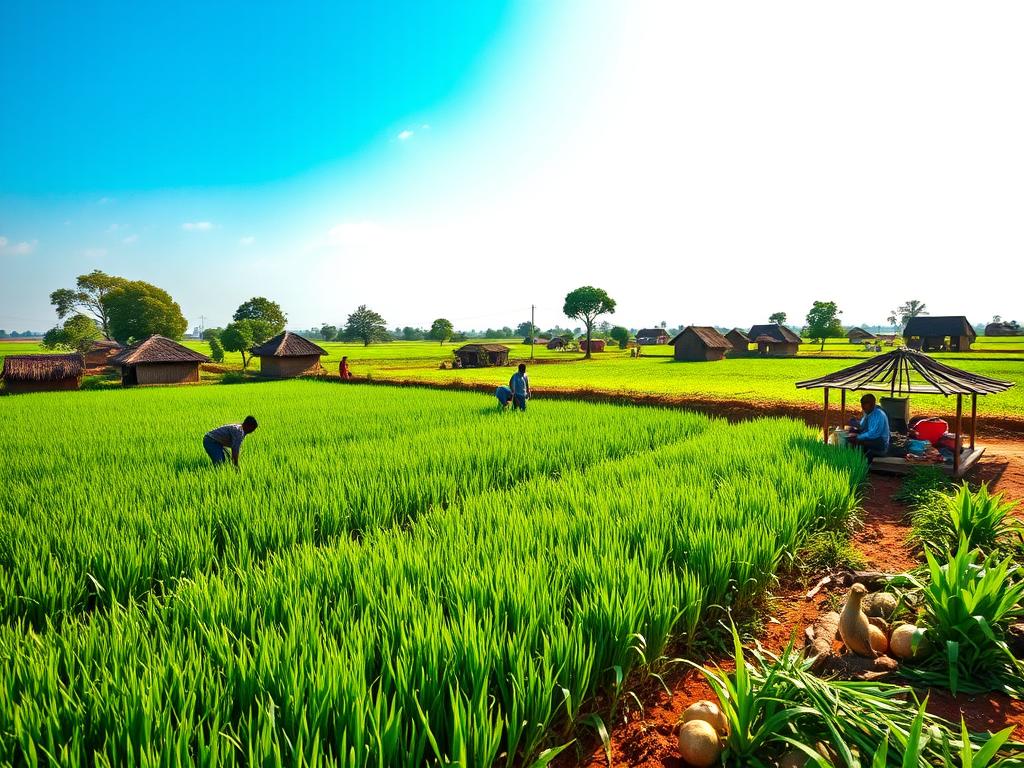
The Future of Agriculture in Nigeria
Nigeria sees a bright future in its agricultural sector. It has the power to boost the economy and bring about development. By using new farming methods and agricultural technology, farmers can increase productivity and sustainability.
Adopting Innovative Farming Methods
Adopting new farming methods is key to Nigeria’s agricultural future. These methods include advanced techniques such as:
- Precision farming – Using GPS, sensors, and data analysis to make the best use of resources like water, fertilizers, and pesticides.
- Vertical farming – Growing crops in stacked layers, making efficient use of space and resources.
- Hydroponics – Growing plants in nutrient-rich water, without soil.
These new approaches help farmers increase yields, cut waste, and lessen their environmental impact. Consequently, this leads to a sustainable and prosperous future for agriculture.
Technology is also vital for the future of agriculture. It includes advanced irrigation systems as well as smart farming apps. As a result, these tools help farmers make better decisions, improve their operations, and ultimately boost productivity.

Conclusion
Agriculture has a huge impact on Nigeria’s economy, society, and the environment. This article has shown how important farming is for growth, food, and taking care of the planet.
Nigeria has a lot of land along with diverse weather conditions that are great for farming. Additionally, its farmers are hardworking and creative. However, there are challenges such as poor road infrastructure, outdated farming methods, and furthermore, a pressing need for green farming practices.
To move forward, Nigeria needs to embrace new technology, as well as adopt green farming practices, while also providing support to small farmers. Consequently, this will help the farming sector grow. By addressing these critical issues, Nigeria can make farming a key part of its success in food production, economic growth, and environmental protection. Ultimately, this will improve lives and create a better future for everyone.
FAQ
What is the importance of agriculture to the Nigerian economy?
Agriculture is key to Nigeria’s economy. It boosts the GDP, creates jobs, and increases exports. It ensures food security and supports rural livelihoods.
What are the major agricultural products and regions in Nigeria?
Nigeria grows crops like cassava, yams, corn, and more. These are mainly from the North, South, and Middle Belt. Each region has its own climate and farming styles.
How does agriculture contribute to economic growth in Nigeria?
Agriculture can boost Nigeria’s economy by increasing productivity and creating jobs. Investing in infrastructure and technology can help more.
What are some of the sustainable farming practices being implemented in Nigeria?
Nigeria is using sustainable farming like crop rotation and soil management. These methods improve soil health and reduce harm to the environment.
How are irrigation and water management important for Nigerian agriculture?
Good irrigation and water management are key in Nigeria, where water is scarce. New methods like drip irrigation help use water wisely and support sustainable farming.
What role does technology play in transforming Nigerian agriculture?
Technology is changing Nigerian farming with precision farming and IoT. These tools help farmers use resources better, monitor crops, and make smarter decisions.
What are the key challenges facing the Nigerian agriculture sector?
Nigerian farming faces challenges like soil and water issues, pests, and climate change. New solutions, infrastructure, and sustainable practices are needed to overcome these.
How does agriculture contribute to food security in Nigeria?
Agriculture is vital for Nigeria’s food security. It helps produce and distribute food, tackling hunger and malnutrition. Supporting small farmers and sustainable practices is key.
What initiatives are in place to empower smallholder farmers in Nigeria?
Supporting small farmers is a priority in Nigeria. Programs offer them technology, training, and resources to boost their productivity and livelihoods.
How is agriculture addressing environmental sustainability in Nigeria?
Nigeria is focusing on sustainable farming to protect the environment. It promotes soil conservation, efficient water use, and climate-smart farming to ensure the sector’s future.
What is the future outlook for agriculture in Nigeria?
Nigeria’s agriculture has a bright future with chances to grow productivity and adopt new methods. With technology, support for farmers, and tackling challenges, it can drive growth and sustainability.

